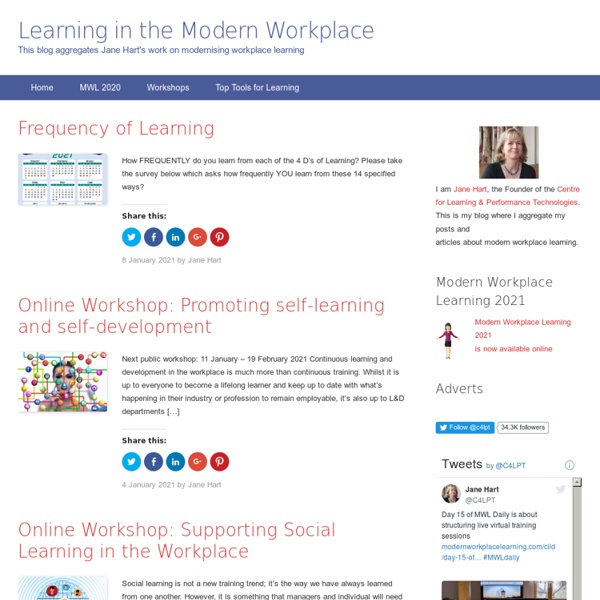Blogs
October 14, 2017 - Politics & Policy+ Politics & Policy (10) Education and the Media
Work-Based Learning Types
Do you like to learn by doing? Check out your work-based learning options in Minnesota. Work-based learning lets you learn through real work experience instead of — or in addition to — classroom learning. Apprenticeship An apprenticeship program: Is for anyone interested in getting a foot in the door of a skilled craft or trade.Is a structured, formal way to gain skills on the job.Is always paid.Combines on-the-job training with classroom instruction.Registered apprenticeships are for adults aged 16 and over.
Becoming a teacher trainer « elteachertrainer
Many teacher trainers are people with extensive knowledge and experience of the subject. They have probably taught many different levels of student, different class sizes, cultures, nationalities, age ranges and students with different needs – from young learners through to adults with specific work-related requirements. Your CV or resume won’t cover every part of the ELT spectrum, but you’ll be a reasonable ‘jack of all trades’ and perhaps even a reasonable specialist in one of two of them. Longevity in ELT is often a job requirement for teacher training and most teachers who move into it have been in the profession for some considerable time. However, the first signs of wanting to train can, in fact, emerge at an early stage of a teacher’s career. You’re standing in the teacher’s room organising some materials for your next lesson and someone asks you what you’re doing with your students today.
About
Contact me via email at richardbyrne (at) freetech4teachers.com About the blog: The purpose of this site is to share information about free resources that teachers can use in their classrooms. In 2008 Free Technology for Teachers was awarded the Edublogs Award for "Best Resource Sharing Blog." In 2009 Free Technology for Teachers was again awarded the Edublogs Award for "Best Resource Sharing Blog" and was awarded the Edublogs Award for "Best Individual Blog."
15 OER tools for educators
Below you’ll find great sources for K-12 OER. Need some higher-ed OER tools? We’ve got a ton of them on eCampus News.
Classroom Management: Using Gaming Elements
Gamification is a term you may have heard in passing, but probably like most of us, are unsure what exactly it means. Simply put, gamification involves using the principles of classroom games to motivate and engage students. We all know that children love video games, and we can see that these game designers really know how to hook our children. So, why wouldn’t we be interested in incorporating some of the bells and whistles that designers use as part of our own classroom games and classroom management tactics? If you think about it, we as adults use one of the elements in gamification probably every day that we go to a store and use our rewards card. What makes you keep going back and getting your coffee card punched?
All About Inquiry-Based Learning
Inquiry-based learning is not a new teaching strategy. In fact, you most likely learned about it in college while studying about John Dewey’s educational reform. Dewey set out to advocate child-centered learning that was based on inquiry and real-world experiences. Unfortunately, in today’s educational system, children are less likely to inquire and ask questions, and more likely to be subservient and listen. Inquiry-based learning is meant to change that.
40 Alternative Assessment Ideas for Learning
When people think of assessment, pencils and bubble sheets may be the first things that come to mind. Assessment does not always have to involve paper and pencil, but can instead be a project, an observation, or a task that shows a student has learned the material. In the end, all we really want to know is that the skill was mastered, right? Why not make it fun and engaging for students as well? Many teachers shy away from alternative assessments because they take extra time and effort to create and to grade. On the other hand, once the assessment guidelines and grading rubric are created, it can be filed away and used year after year.
27 Ways To Increase Student Engagement In Learning
Student engagement in learning is kind of important. No matter the best practices of your curriculum mapping, instructional strategies, use of data for learning, formative assessment, or expert use of project-based learning, mobile learning, and a flipped classroom, if students aren’t engaged, most is for naught. Historically, student engagement has been thought of in terms of students “paying attention”: raising hands, asking questions, and making eye contact.
Current thinking on the 7Cs of Learning Design
7 cs update from Grainne Conole I had a great brainstorming session on Friday with the team. Gabi Witthaus has already blogged about this. In this post I want to describe our current thinking on the 7Cs of Learning Design. We have now regrouped the 7Cs into four categories:
A Collection Of The Best Education-Related “Most Popular” Lists For 2014
With the end of the year rapidly approaching, many educators and organizations are putting together various “most popular” lists. I thought I’d bring together the best of them in one place, and will be continuing to add to this post over the next couple of weeks. Feel free to let me know which ones I’m missing: I’ll start with my own: My Most Popular Posts In 2014.
Is Education Killing Creativity?
I recently had a strange interaction with my students. I was teaching the second of a department-required, two-semester course series on design in a class where all sixteen of my students were majoring in communication—many of whom were about to graduate in a few months. In my original syllabus, I had developed a final project for my students, a project that required them to build a branding identity for a small business.



